Democracy and Inequality: Who Rules in Capitalist Democracies?
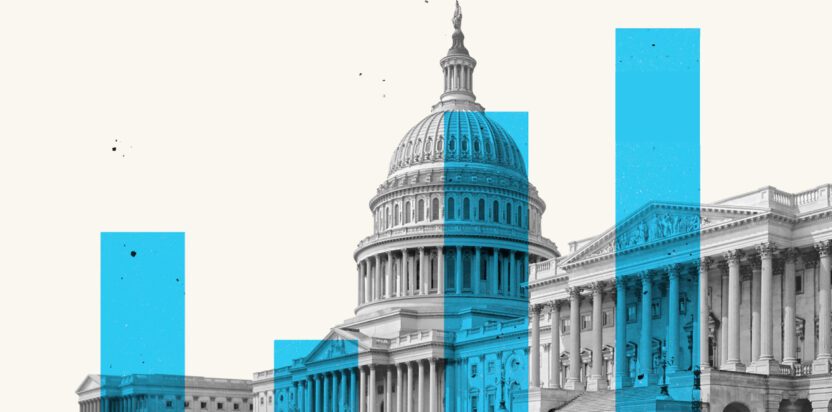
Encyclopedia: Democracy, Inequality, Capital, Economic Mobility, Civic Engagement

“How does one put together a democracy based on the concept of equality while running an economy with ever greater degrees of economic inequality?”
- Lester Thurow, American Economist
Income and wealth inequality are rising rapidly around the globe. In just the United States, one analysis found that the disparity in wealth between the wealthiest and most economically disadvantaged American families more than doubled between 1989 and 2016[1]. Another study indicated that the gains in the U.S. national income overwhelmingly favored the highest earners, with 60% of the increase in national income since 1977 going to only the top 1% of earners, and the top 0.01% experiencing the largest increase in income (Piketty 2017). This trend is not unique to the United States but observed in other major democracies and economies but studies differ in the extent to their findings (Figure 1 and 2). Modern advanced democracies and capitalist economies have developed together over the last two centuries under specific rules and conditions (Lamoreaux and Wallis 2023). Going forward, increasing economic inequality raises important questions for policymakers.
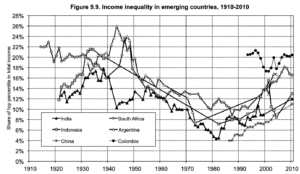

Figure 1: Income Inequality in Anglo-Saxon and Emerging Countries. Source: Thomas Piketty’s “Capital in the Twenty-first Century.”
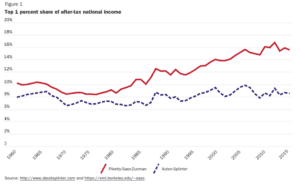
The relationship between capitalism and inequality has been extensively studied and debated. The Kuznet curve, proposed by Simon Kuznet in the 1950s, posited that as countries develop, inequality initially increases, reaches a peak, and then begins to decrease (Exhibit 3). However, the persistent and expanding levels of inequality challenge this theory. Some economists blame capitalism’s strong profit incentives for driving growing economic inequality within major economies. Economist Thomas Piketty’s Capital in the 21st Century argued against the Kuznet curve theory, and points out the growing wealth to income ratio as a major concern and driver of economic inequality. He states that absent government intervention to tax wealth, an economic elite class will form that predominantly inherited their wealth. Over the past two decades, the implementation of wealth taxes in Europe has significantly decreased, with only Norway, Spain, and Switzerland currently levying such a tax. The taxes resulted in high administrative costs, negatively affecting saving and investment behavior, causing the wealthy to relocate their assets to avoid taxation all while not raising much revenue (Rosalsky 2019).
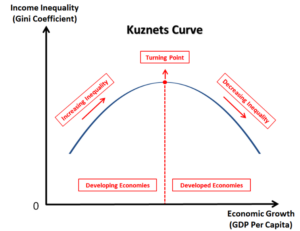
In democratic societies, economists and scholars have questioned why inequality continues to persist and whether it poses a threat to democratic governance. Democracy is based on the idea of an equal distribution of power vested in the people through “one person, one vote.” However, when wealth is disproportionately held by a select few, it could undermine the realization of this democratic ideal. Despite this, other economists argue that everyone is still better off in a capitalist economy that fosters innovation, particularly benefiting the poorest members of a society (Edwards and Bourne 2019).
Challenges To Democracy
While the ideals of democracy and inequality persistent in capitalistic economies can seem in conflict, many scholars conclude that inequality in the contemporary advanced capitalist democracies has been sustainable. One investigation into inequality and democratic governance in the Philippines, Malaysia, Singapore, and South Korea found that inequality is only loosely associated with weaker democracies in this region (Hass 2022). Possible explanations on why inequality has been persistent in democratic societies include the division of society based on non-wealth groupings, such as political affiliation that is not significantly correlated with wealth (Edwards and Bourne 2019). Additionally, the sustainability of this coexistence can be attributed to voters’ perception that wealth redistribution is unfair, and overall rising living conditions may reduce the pressure on governments to implement costly social insurance programs (Bonica et al. 2013).
Some other explanations for why democratic societies allow persistent inequality stem from the possibility that the wealthy wield an outsized influence over the government, thwarting wealth redistributive policies. These scholars point to evidence that immigrants and the poor are less likely to have the means to vote in elections, and the advantages that the wealthy have in policy making through campaign contributions, lobbying, and revolving door employment that contributes to policy gridlock (Bonica et al. 2013). Some researchers have claimed that governments being captured by the rich accounting for wealth inequality is less convincing than is often claimed. Additionally, research indicates that wealthy individuals have diverse policy views and do not disproportionately succeed in getting their goals enacted (Exhibit 4) (Edwards and Bourne 2019). Yet inequality has been linked to the probability of shifts from democratic governance to dictatorship (Houle 2009).
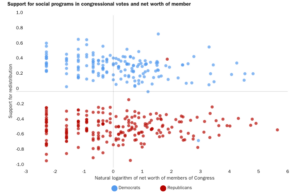
Unequal But Better Off?
Some scholars argue that inequality data often reflects economic innovation that is raising overall living standards and resulting in everyone being better off. They point to evidence that shows that wealthy individuals who have simply inherited their wealth have declined significantly in the past 30 years. This points to a major possible reason as to why wealth redistribution policies have not been implemented in democracies. Some even argue that welfare programs can increase wealth inequality by reducing the incentives and ability for low to moderate income households to engage in wealth building practices (Edwards and Bourne 2019).
However, there is also evidence that income inequality is associated with negative economic growth trends. Research by the International Monetary Fund argues that the unequal opportunities that stem from economic inequality can prevent long term growth. Unequal access to education, segmented labor markets (insiders vs. outsiders), and biased financial systems sustain higher inequality of opportunity, benefiting the better-off while disadvantaged others.
Assignment
Use the data analysis tool for the following questions.
- Utilizing the data analysis tool, examine the historical trends of income or wealth inequality (Gini Coefficient) in the United States, Norway, France, Mexico, and South Korea. Also, consider relevant metrics from the Democracy Index and other data that measure democratic functioning. Can you identify any discernible patterns or relationships within the data?
- Explore the relationship between economic growth (Real GDP per Capita) and innovation (Patent Applications, Residents) in these same countries, and their corresponding Gini Coefficients. Is there a noticeable connection between economic growth, innovation, and income inequality?
- Investigate the correlation between the Gini Coefficient and the top marginal income tax rate. Additionally, consider other variables in the dataset. Can you predict the potential impact of such a tax policy on economic growth, wealth redistribution, and overall societal well-being?
- Given your findings, analyze how the increasing concentration of wealth among a few individuals affects political power and influence within democratic societies. Is it conceivable to maintain a functional democracy when economic inequality reaches extreme levels?
- Examine whether there exists a tradeoff between economic growth, innovation, democratic strength, and equity in society. Based on the available data and your own research, identify a country that seems to manage these factors particularly well. What policies contribute to this country’s success in striking a balance?
Notes
Bonica, Adam, Nolan McCarty, Keith Poole, and Howard Rosenthal. 2013. “Why Hasn’t Democracy Slowed Rising Inequality?” American Economic Association. https://www.aeaweb.org/articles?id=10.1257/jep.27.3.103.
Edwards, Chris, and Ryan Bourne. 2019. “Exploring Wealth Inequality.” Cato Institute. https://www.cato.org/policy-analysis/exploring-wealth-inequality.
Hass, Ryan. 2022. “Democracy and inequality | Brookings.” Brookings Institution. https://www.brookings.edu/articles/democracy-and-inequality/.
Houle, Christian. 2009. “Inequality and Democracy: Why Inequality Harms Consolidation but Does Not Affect Democratization.” World Politics 61 4:589–622.
Lamoreaux, Naomi, and John Wallis. 2023. “Democracy, Capitalism, and Equality: The Importance of State Mandates for General Laws.”
Piketty, Thomas. 2017. Capital in the Twenty-First Century. Cambridge: The Belknap Press of Harvard University.
Rosalsky, Greg. 2019. “If a Wealth Tax is Such a Good Idea, Why Did Europe Kill Theirs?” NPR. https://www.npr.org/sections/money/2019/02/26/698057356/if-a-wealth-tax-is-such-a-good-idea-why-did-europe-kill-theirs.
“Trends in U.S. income and wealth inequality.” 2020. Pew Research Center. https://www.pewresearch.org/social-trends/2020/01/09/trends-in-income-and-wealth-inequality/.

